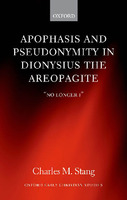Apophasis and Pseudonymity in Dionysius the Areopagite
Author(s)
M. Stang, Charles
Collection
OAPEN-UKLanguage
EnglishAbstract
This book argues that the pseudonym, Dionysius the Areopagite, and the influence of Paul together constitute the best interpretive lens for understanding the Corpus Dionysiacum [CD]. This book demonstrates how Paul in fact animates the entire corpus, that the influence of Paul illuminates such central themes of the CD as hierarchy, theurgy, deification, Christology, affirmation (kataphasis) and negation (apophasis), dissimilar similarities, and unknowing. Most importantly, Paul serves as a fulcrum for the expression of a new theological anthropology, an “apophatic anthropology.” Dionysius figures Paul as the premier apostolic witness to this apophatic anthropology, as the ecstatic lover of the divine who confesses to the rupture of his self and the indwelling of the divine in Gal 2:20: “it is no longer I who live, but Christ who lives in me.” Building on this notion of apophatic anthropology, the book forwards an explanation for why this sixth‐century author chose to write under an apostolic pseudonym. It argues that the very practice of pseudonymous writing itself serves as an ecstatic devotional exercise whereby the writer becomes split in two and thereby open to the indwelling of the divine. Pseudonymity is on this interpretation integral and internal to the aims of the wider mystical enterprise. Thus this book aims to question the distinction between “theory” and “practice” by demonstrating that negative theology—often figured as a speculative and rarefied theory regarding the transcendence of God—is in fact best understood as a kind of asceticism, a devotional practice aiming for the total transformation of the Christian subject.
Keywords
pseudo-dionysius; dionysius the areopagite; st. paul; apophasis; mysticism; corpus dionysiacum; pseudonymity; negative theology; apophatic anthropology; Creative Commons; God; Jesus; Late antiquity; Neoplatonism; Paul the Apostle; TheurgyDOI
10.1093/acprof:oso/9780199640423.001.0001ISBN
9780199640423OCN
1030815291Publisher
Oxford University PressPublisher website
https://global.oup.com/Publication date and place
2012Grantor
Series
THE OXFORD EARLY CHRISTIAN STUDIES,Classification
Christianity
History of religion
Theology
Mysticism


 Download
Download Web Shop
Web Shop